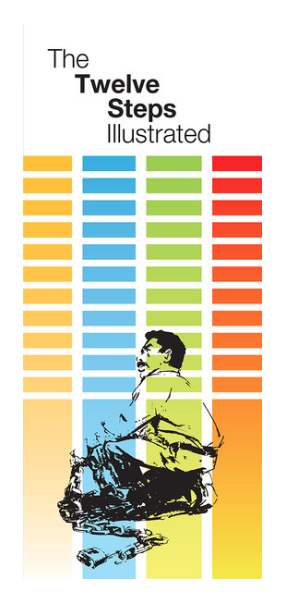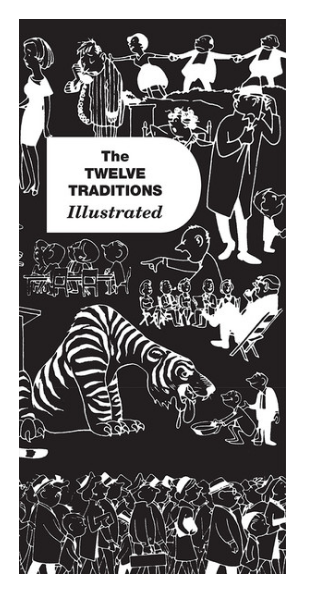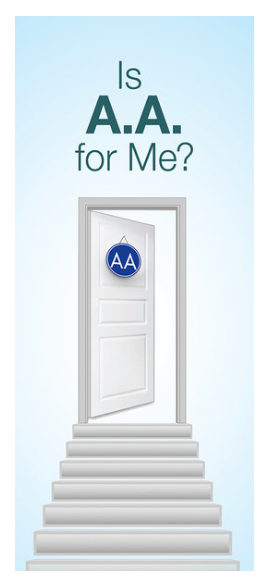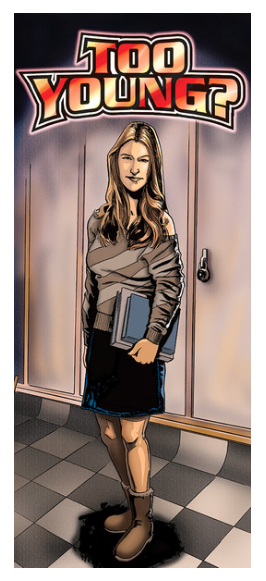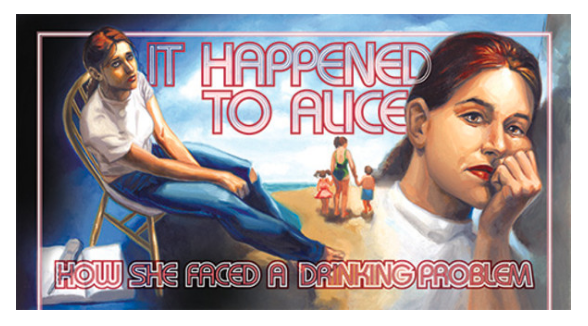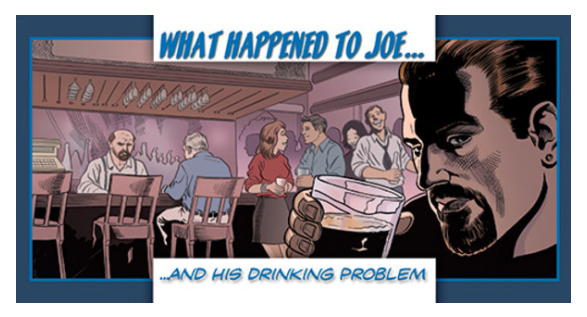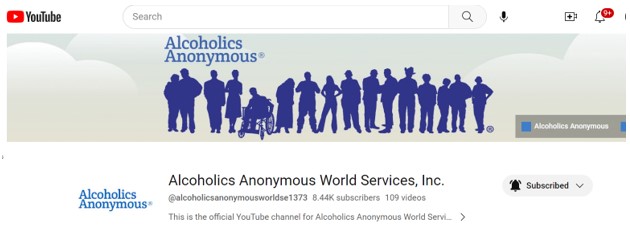Intellectual or Cognitive Difficulties:
Reading Relatability / Comprehension / mental or neurological health conditions
“Intellectual or Cognitive Difficulties” refers to barriers surrounding reading relatability or comprehension ability; mental, emotional, or learning disorders; neurological injuries, i.e., stroke, head injury, memory).
Introduction
Imagine these situations:
- You are in a Big Book meeting and have read a chapter as a group. It is now a round-robin discussion time. You were not able to understand the reading and come to any conclusions. You want to share but you cannot think of any way possible.
- You shake from a neurological disorder. You spill your coffee at a meeting almost every time and get embarrassed.
- You are in the preliminary stages of dementia. Sometimes your memory is clear and other times, you cannot remember who your home group members are.
- You have a learning disability and have trouble pronouncing words. You are asked to read the Traditions at a meeting and become full of fear.
Intellectual and cognitive difficulties can have several negative effects on the alcoholic. Chances are that there are easy, small, common-sense solutions we can offer to help. This guidance document offers some suggestions.
Area 26 groups, districts, accessibilities committees, and individuals have a duty to do all we can to provide solutions to alcoholics with potential barriers in receiving the Alcoholics Anonymous message of hope, in participating in our program of recovery, and in providing service work.
“Our Twelfth Step — carrying the message — is the basic service that the A.A. Fellowship gives; this is our principal aim and the main reason for our existence. Therefore, A.A. is more than a set of principles; it is a society of alcoholics in action. We must carry the message, else we ourselves can wither and those who haven’t been given the truth may die.” – AA’s Legacy of Service, Bill W. (1951)
How the Group Can Help
Members with limited reading abilities can be less evident than A.A.s with other needs and may find it difficult to ask for help. Here are ways to provide information without causing embarrassment:
- The group’s literature chair can make a point of announcing that many books, pamphlets, and Grapevine articles are available on tape.
- If a member has trouble reading, the group can set up Step or Traditions meetings so that the Step or Tradition is read aloud at the beginning of the meeting. This is helpful practice for everyone in the group!
- Sponsors or other group members can also offer one-on-one help with reading, relatability, making conclusions, and comprehension.
Zoom Meetings and Other Online Meeting – Turn on Captions
Some attendees may find captions during online meetings helpful, as an accessibilities tool, to see and read meeting communications.
Host – Enable automated captioning for meetings.
Attendees – If you would like to view captions during the meeting and are not familiar with how to enable them on your computer, smart phone, or tablet, ask the host for guidance.
In Zoom, if you want to automatically show captions whenever they are available:
Sponsoring an Alcoholic with Intellectual or Cognitive Difficulties
Area 26 groups, districts, accessibilities committees, and individuals ought to do all we can to provide accessibilities solutions to alcoholics with potential barriers in receiving the Alcoholics Anonymous message of hope, recovery, and unity.
We want the hand of A.A. to be available to all alcoholics who reach for it.
When sponsoring an alcoholic with such accessibility barriers, the sponsor may need to read the Big Book to the sponsee. The sponsee could ask to stop when he or she does not understand. It is important to have a dictionary and work with the sponsee on looking up the words the sponsee has difficulty with. The sponsor’s experience, strength, and hope and knowledge of how to guide the sponsee in working the Steps is crucial. The sponsee can also try to use the audible and visual literature, mentioned earlier, along with their dictionary.
When a Sponsor or Other Support Group Member Shows Signs of Intellectual or Cognitive Difficulties
When a sponsor or other member of one’s support group begins showing signs of intellectual or cognitive difficulties, this can be a challenging time for both of you.
- Practicing PATIENCE, LOVE, AND TOLERANCE has never been more important.
- Gentle REPETITION, REPETITION, REPETITION can help.
- Helping get these alcoholics to meetings and fellowshipping as much as possible can keep the alcoholic surrounded by those with the message of hope.
- Keeping a Big Book always around is wise. Reading together or saying familiar prayers with the alcoholic with intellectual or cognitive difficulties might just bring some serenity.
- Getting the alcoholic out of the house and around others is likely to help the family as well.
Audible and Visual Books
NOTE: Read aloud tools and word search tools are available using most computer browsers and smart phone apps.
The Big Book | Alcoholics Anonymous | aa.org
This is the Fourth Edition of the Big Book, the Basic Text for Alcoholics Anonymous Hardcover Version available from AA Online Store.
The Big Book | Alcoholics Anonymous | (CD) | aa.org
● Many of the purchase option devices can slow down the narration speed which could help with the listener’s ability to comprehend the Big Book.
● Most of these Big Book options have features such as word look up, word search, the ability to highlight or write notes.
Twelve Steps and Twelve Traditions | aa.org – Read, Listen, or Watch on aa.org
Living Sober | aa.org
Audiovisual Pamphlets
Young and Sober in A.A.: From Drinking to Recovery
Young and drinking too much? Through the A.A., these young people got sober and found recovery. If you want to stop drinking, Alcoholics Anonymous can help you, too. You’re never too young to get sober.
Sobriety in A.A.: We made changes to stop drinking
Drinking problem? If you want to get sober, A.A. offers a solution. Alcoholics Anonymous helps alcoholics stop drinking — and live a better life — one day at a time.
Living Sober – Pamphlets – Audio Version
Audio Public Service Announcement Downloads
A.A.’s public service announcements (PSAs) help us communicate our message of hope and life-changing possibilities to the millions who may benefit. Audio PSAs are available at no cost to your station.
Illustrated Literature / Easier to Read Literature
AAWS YouTube Channel
AA Grapevine YouTube Channel
Big Book Reading Relatability and Comprehension Research Information
70 GSC Big Book Presentation on Vimeo (vimeopro.com)
- To view presentation above: Control+Click on the link above.
- This presentation was requested at the 70th General Service Conference (GSC). This thought-provoking video, intended for the AA fellowship, discusses the complexity of the Big Book regarding at different education levels as it relates to the ability to read, relate, and comprehend the Big Book. The statistics and examples of passages in the Big Book presented are quite remarkable.
- Agenda item status for plain and simple language translation of the Big Book, as of 72nd GSC:
The committee reviewed a progress report regarding the translation of the book Alcoholics Anonymous (Fourth Edition) into plain and simple language. The committee requested that a progress report or draft manuscript be brought back to the 2023 Conference Committee on Literature.
Why Helping Those with Intellectual or Cognitive Obstacles to Receiving the AA Message of Hope Is So Important
If we can do a better job of reaching out to alcoholics with intellectual or cognitive difficulties, who may face barriers to accessing the A.A. message, we help this large group of alcoholics to carry the message to other alcoholics they may already know or will encounter, providing a powerful example that it is possible to achieve sobriety and help others despite access obstacles.
I Am Responsible…
When anyone, anywhere, reaches out for help,
I want the hand of A.A. always to be there.
And for that: I am responsible.
Reprinted from The A.A. Service Manual, pg. II,
with permission of A.A. World Services, Inc.
For questions or comments, contact Area 26 Accessibilities Coordinator, accessibilities@area26.net.


